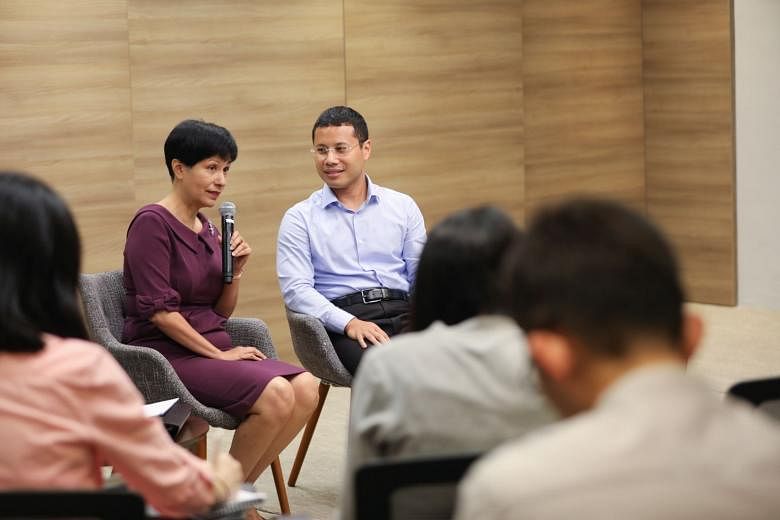SINGAPORE - When a couple separate, things can become complicated for their children, especially if they are of school-going age.
One parent usually keeps the flat. The other may put up temporarily with friends or relatives, shuttling from one home to another across different parts of the island. The children are split up between them.
The unstable living arrangements may cause a child to miss school for a long period of time, because he is now far away from his school or he has no one to take him to school as his parent, the primary caregiver, has to work.
This problem is exacerbated for lower-income families in rental flats, as a divorcing parent would not have the means to buy a new flat and needs to wait for approval from the Housing Board (HDB) to rent another flat under the Public Rental Scheme.
The child could end up lagging behind his peers, which worsens the inequality gap.
The Government recognises that it would not have all the solutions to address complex challenges such as inequality, said Minister for Social and Family Development Desmond Lee.
"(But if we) harness the energy and the collective wisdom of the community, we can get a lot more viewpoints and ideas, and implement them together," he told reporters on Monday (Dec 30), when he and Second Minister for Finance and Education Indranee Rajah gave updates on the new citizen engagement initiative Singapore Together.
Ms Indranee drew on the above example of the school-going child to flesh out how the Singapore Together movement represents a significant change in how the Government engages and works with its partners, particularly when it comes to tackling complex issues.
The Government has worked with community groups by giving funding, but they typically worked in silos.
"(Now), the Government is using its convening power, or its coordinating power, in partnership with groups out there," said Ms Indranee, who is also Minister in the Prime Minister's Office.
In the case of the child, the HDB and the Social Service Offices may be able to step in to find alternative housing for his parent located near his school. Other efforts to help him catch up with his peers can also be corralled.
Ms Indranee leads the inter-agency Uplifting Pupils in Life and Inspiring Families Taskforce (Uplift) set up in 2018, which aims to help children from disadvantaged homes level up.
Uplift can work with his school, charities and neighbours in his estate to sustain the efforts, she said.
It can look for a friend or neighbour who can help to take the child to school, for instance, or tap its network of partners to find out if there are any alternative solutions at the local level.
For instance, one school offers free transport for students at risk of long-term school absenteeism, she noted. Uplift can also link the child up with charities that can give the child tuition, she added.
Long-term absenteeism and irregular attendance in school are issues that Uplift aims to tackle. It often stems from complex family issues and can affect a student's progress.
While the previous model of doing things has seen good results, bringing together a number of different groups can catalyse an effective, more holistic solution. "You suddenly can get things moving because people contribute different things to the whole project."
Another example of a citizen-led initiative that embodies the spirit of the Singapore Together movement is the Partners Engaging and Empowering Rough Sleepers (Peers) network that the Ministry of Social and Family Development (MSF) launched last July with various community groups helping the homeless in Singapore, said Mr Lee.
Many of them are homeless due to complex challenges, including relationship problems or financial and mental health issues, but some may be hesitant to seek help from government agencies.
To better understand issues on the ground, Mr Lee and MSF officers have joined community groups on their regular night walks since 2017, where volunteers befriend and offer help to the homeless.
With community partners as trusted intermediaries, more rough sleepers could be convinced to seek help from various government agencies, added Mr Lee. Through Peers, MSF has engaged 160 rough sleepers and helped 65 of them find long-term housing. Another 37 of them have been moved to interim accommodation, MSF added.
"By walking with our partners, we get to see the (ground) dynamics. We get to share with them how we can work together... We are better able to make the policies come alive to bring support to these individuals," said Mr Lee, adding that developing partners' trust is key if the Government hopes to work even more closely with them.
Various ministries are experimenting with different ways of engaging citizens under Singapore Together - from citizens' panels to bringing different community groups together in work groups, said Ms Indranee.
The Government does not have "a monopoly on ideas", she added, "and ideas should come from people too. Because people are the beneficiaries of these ideas... Singaporeans must have the ability to have a say in, and shape our future".


